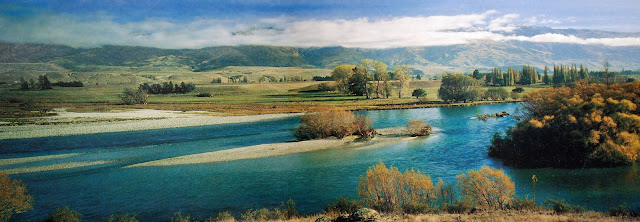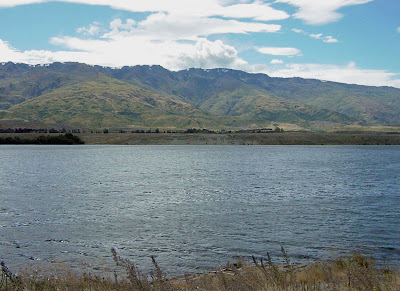Lowburn ~ Sold Down The Reservoir
The Lowburn community began as a prominent ferry landing during the early years of Central Otago's settlement, when travellers moved between the goldmining reefs of Bendigo and the township of Cromwell. A ferry or punt began operating on the Clutha River at Lowburn from about 1873, and the crossing, with its tree-lined approaches and picturesque setting became not only an important link between Cromwell and the lakes at Wanaka and Queenstown, but also a popular tourist excursion. A bridge was built in 1938 replacing the punt, and the occasion was celebrated by a banquet at the Lowburn Ferry Hotel followed by a dance at the Lowburn Hall.
So important was the ferry, that even after the bridge was built, the community was still referred to as Lowburn Ferry. Beyond the settlement at the crossing, the valley extending up the river contained some of the most productive farmland in Central Otago, and some of the most scenic. Orchards also filled the smaller valley behind the hotel, where an ideal micro-climate suited the stonefruit grown there.
The inner floodplain of the Clutha River, naturally braided as it approached Deadman's Point, had been extensively dredged above and below the crossing, and this unique section of the river had become a maze of river channels and swimming-holes, lined with mature willows, sometimes called the 'Hundred Islands'. Not surprisingly, the area had become popular with campers during high summer. Small tracks weaved among the old tailings, arriving at campsites and swimming-holes.
Rumours of further hydro-electric development that might inundate more gorges and valleys had circulated since the completion of the Roxburgh dam in 1956, and these rumours surfaced with a vengeance in the 1970's. Uncertainty over the future of the Lowburn area became a topical subject in the Lowburn pub as locals contemplated the possible demise of their community.
In the lead up to the New Zealand elections in 1975, one aspiring candidate was Warren Cooper. When questioned at the Lowburn pub by Shorty Sutherland, a retired gold-miner who lived across the road, Mr Cooper promised not to flood Lowburn and the pub. Mr Cooper said: "If you want water in your whiskey, vote Labour."
 Shorty Sutherland, and Pythagoras the cat, Lowburn. 'Someone should have shot him (Muldoon) years ago. Me, I wouldn't waste my ammunition. You can tell him that from me.' He was assured by MP Warren Cooper that Lowburn would not be flooded.
Shorty Sutherland, and Pythagoras the cat, Lowburn. 'Someone should have shot him (Muldoon) years ago. Me, I wouldn't waste my ammunition. You can tell him that from me.' He was assured by MP Warren Cooper that Lowburn would not be flooded.In 1977, Warren Cooper MP, strode onto the recently constructed Clyde dam lookout, beyond which work had begun on the dam that would eventually flood the Cromwell Gorge, part of Cromwell and much of the Lowburn area including five orchards and the Lowburn pub - where he had made his earlier promise not to flood the hotel and the surrounding area. He had come to address a protest group called "Clutha Rescue," who had set up camp at the lookout. Mr Cooper asked: "Why can't you support me over the construction of this dam?"
The building of the dam was opposed by five landowners at Lowburn and two in the Cromwell Gorge. They took their case against the Government to the High Court in Wellington, who ruled in their favour, determining that there was no end user for the power at Clyde and that the applicant had no water right.
But Prime Minister Robert Muldoon rallied his supporters. In the end, legislation was passed with the help of the two Social Credit MP's. The Clutha Development (Clyde Dam) Empowering Act was enacted on the 30th of September 1982. All legal avenues for legitimate objection had been removed.
 Lowburn pub sign in the 1980's ~ 'In 198? this hospitable place could be 20 metres beneath the new Lake Dunstan.' This sign of a man having a beer through a snorkel was placed on Lowburn's Welcome Home Hotel in the 1980's. It voiced the stoic despair of a community facing inundation if, and when, the Clyde dam reservoir would be pronounced safe enough to fill.
Lowburn pub sign in the 1980's ~ 'In 198? this hospitable place could be 20 metres beneath the new Lake Dunstan.' This sign of a man having a beer through a snorkel was placed on Lowburn's Welcome Home Hotel in the 1980's. It voiced the stoic despair of a community facing inundation if, and when, the Clyde dam reservoir would be pronounced safe enough to fill.The Lowburn community had been cast aside, sold down the reservoir, lock stock and beer barrel. Outside the pub, a sign appeared showing a man drinking a beer through a snorkel. In 1988, the bulldozers arrived to demolish the hotel and 'reshape' the valley. The Welcome Home Hotel, the Motor Camp, the houses along the main street, five orchards, the concrete arch bridge across the Clutha, the "hundred islands" with numerous popular campsites and swimming-holes, and some of the best farmland in the region, all disappeared into the pages of a bitter history.





